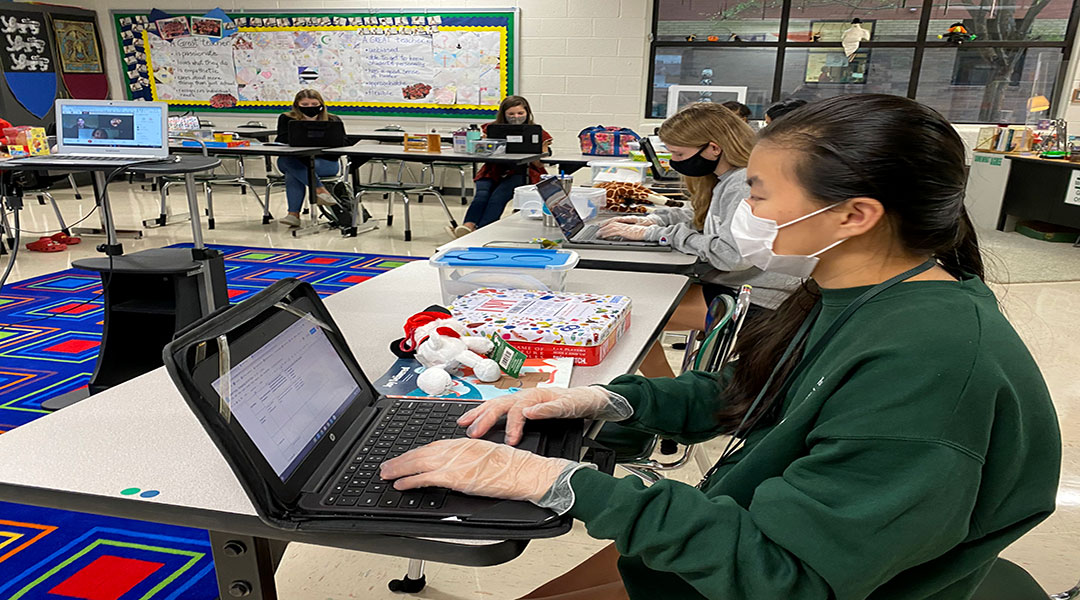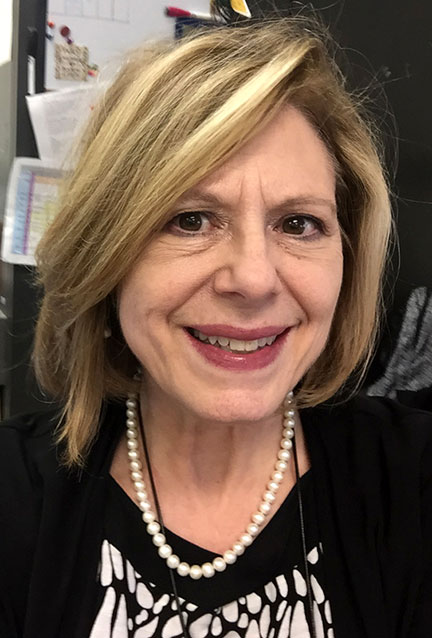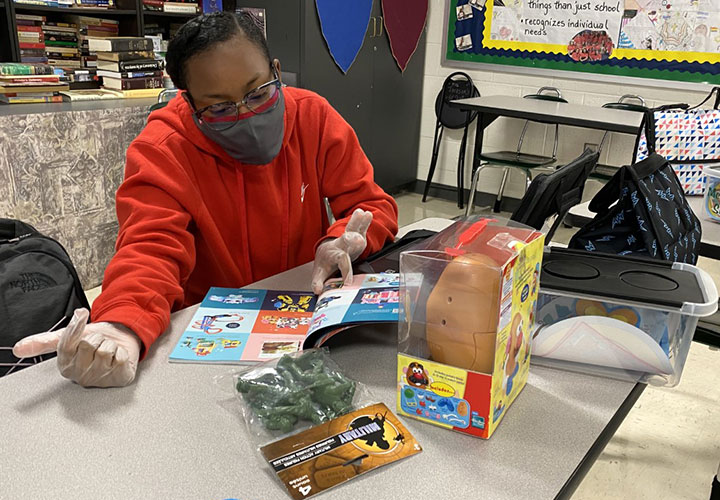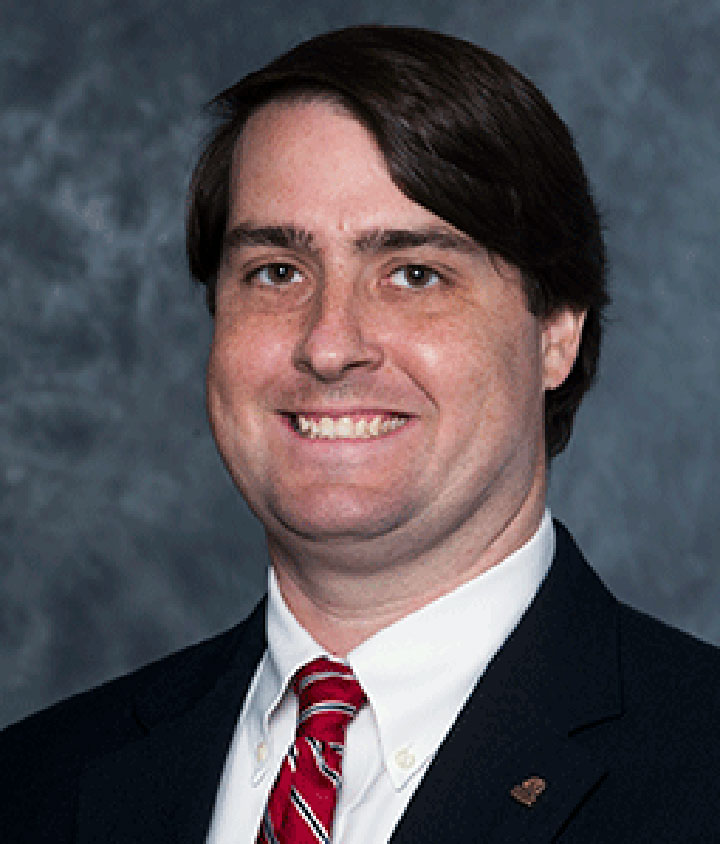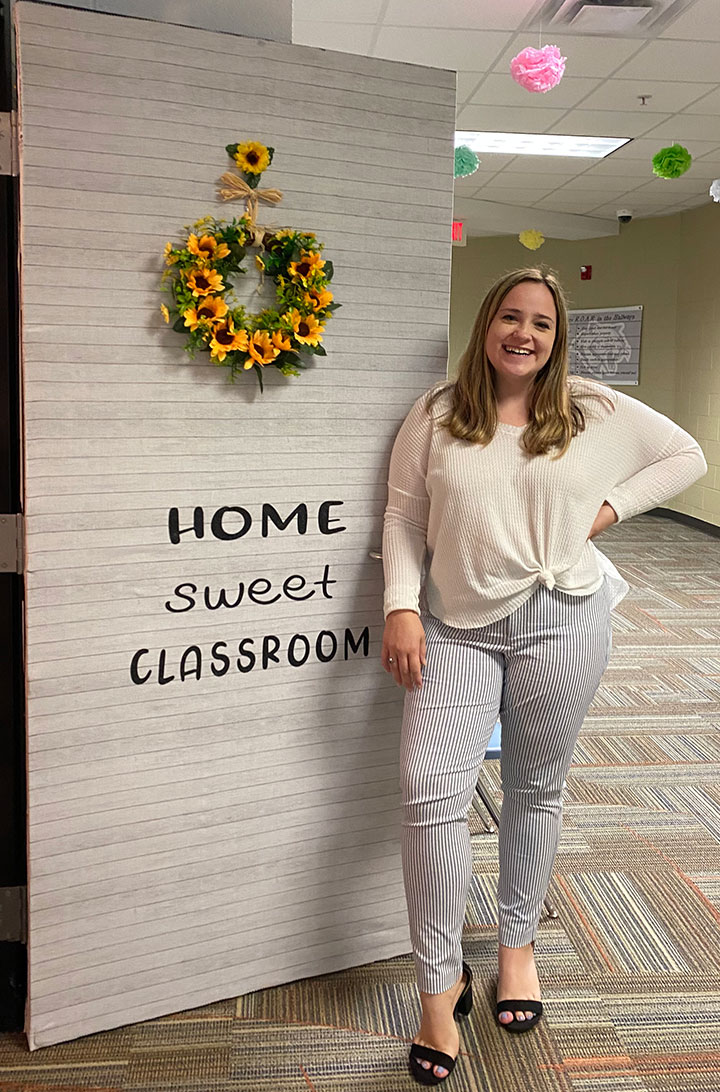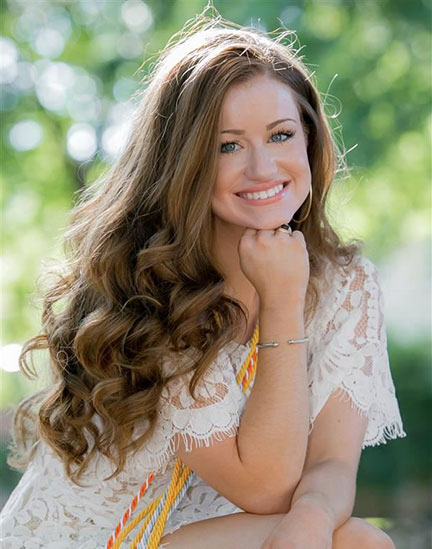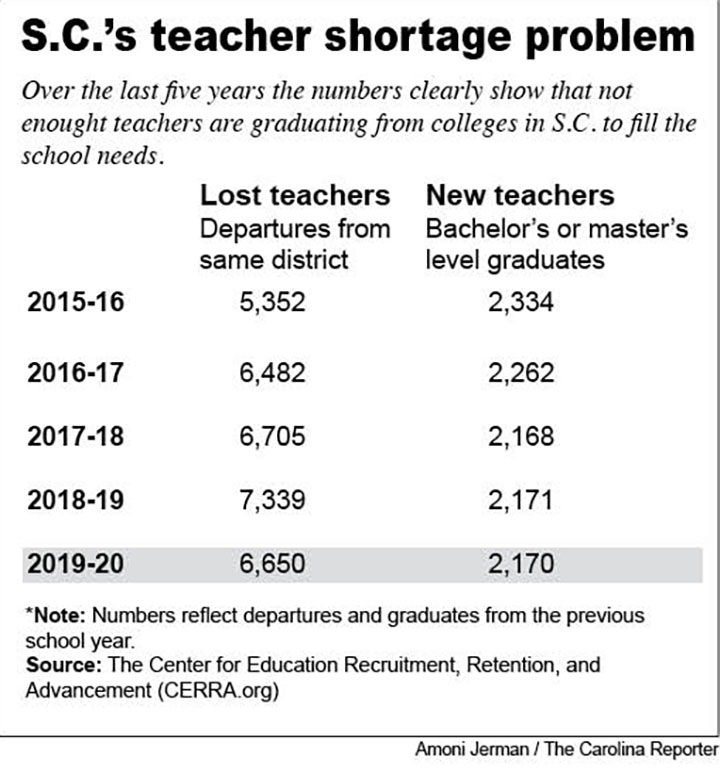The Teacher Cadet course focuses on giving students hands-on experience, while promoting advocacy and increasing awareness for public education in South Carolina. Photo Credit: Carol Jackson
Over the years, Carol Jackson has opened her classroom to over 100 Teacher Cadets, South Carolina high-school students who are on their way to become educators and advocates for public education.
The Dutch Fork High School teacher said schools need the best, the brightest and the smartest teachers to give students the highest level of education, but there are two barriers that South Carolina must overcome to achieve teacher retention: teacher pay and community respect.
“If our legislators can see their way to rewarding teachers at the same level we reward any other professional then more people would be willing to go into it,” said Jackson, who teaches Teacher cadet. “Teachers have the same rent, the same car payment so the pay is important because you want those teachers to stay.”
The high school Teacher Cadet program, a college credit course that is available in 50 states, allows students to get hands-on teacher training inside the classroom before they get to college. Jackson says the program is making a difference in the number of teachers in S.C.
According to the 2019-2020 S.C. Educator supply and demand report, 6,650 South Carolina teachers from the previous school year didn’t return to a teaching position in the same district, making the need for teachers a priority.
Victoria Harpe joined Teacher Cadet as a junior at Cheraw High School. She came to USC where she was a member of the Teaching Fellows program and she’s now a first-year teacher at Harbison West Elementary School.
Harpe said her experiences from Teacher Cadet, Teaching Fellows and the South Carolina Center for Education Recruitment, Retention, and Advancement, which is located at Winthrop University, helped her to be better prepared in her first year of teaching second-grade.
“What happens frequently is that once [students] are in the class, many of them see a side of teaching they have never seen before,” Jackson said, “and they either choose to become a teacher by the end of their senior year and go into the education program and college of their choice, or they go to college to major in something else and they realize they don’t love it.”
“And they remember that they did love being with kids and teaching and they change their major,” Jackson said.
Jackson has taught almost over 100 cadet students who are now school teachers.
“Multiply that by all of the high schools in South Carolina,” she said.
Jackson, who has taught for 44 years, attracts students by making the class active and engaging. She uses a variety of methods to teach her class, the most important being hands-on activities.
“When the students came into class, I had toys all around the tables and Christmas toy catalogs. And what they had to do was examine the toy, look at the ages that the toy said it was good for, go back into their understanding of child growth and development and determine ‘is this appropriate?’”
CadetStudents are required to complete an internship during the academic year that is designed to expose them to children and the classroom, otherwise known as the ‘crown jewel.’
“They get to go out and spend that time as a student teacher. By the first of March, they don’t come to my classroom anymore, they go straight out into their school, the classroom where they have been assigned,” Jackson said. “They’re out there teaching, working with children and helping the teacher.”
During 2019-20 academic school year, nearly 3,000 South Carolina students completed the Teacher Cadet-Experiencing Education course, but with the coronavirus pandemic still raging, that number might decrease for the 2020-21 academic school year.
Jackson alone lost 10 students who would have been in the cadet program this year due to scheduling issues. Luckily, she was able to make up for it through virtual school.
“There was not a Teacher Cadet class offered in the virtual academy, so I agreed to accommodate them (students) because I didn’t want them to lose the opportunity just because they were choosing or needed to be home and safe,” she said.
Most students who graduate high school with a Teacher Cadet credit choose to major in education or apply for the Teaching Fellows program, a fellowship that provides support for students in exchange for an agreement to serve South Carolina public schools once they graduate college.
Harpe said being apart of the Teaching Fellows program has helped her form connections with other teachers in South Carolina and people in higher education.
“We have a sophomore experience in Teaching Fellows where we go and meet with all the other Teaching Fellows in the state,” Harpe said. “I got to meet other people all throughout the state that are now first-year teachers. So that gives me an additional level of support because I have that community to be there to encourage me.”
Derrick Hines, UofSC’s Teacher Cadet coordinator and director of the Teaching Fellows program, said there are two goals of Teacher Cadet.
“The first one would be to help students who are considering education as a career really get more knowledge and hands-on experience within education,” he said. The second goal is “to help promote the advocacy of public education.”
The second goal might be the most important, considering today’s headlines about education concerning funding, low salaries, and a lack of resources inside schools.
“Their (students) families tell them ‘don’t become a teacher.’ Society and culture tells them ‘don’t become a teacher.’ They see everything and so it’s hard for them to choose in spite of all of that to become a teacher,” Jackson said.
Harpe, whose mother has been a school teacher for 32 years, said she has always been passionate about advocating for public education and for teachers in the classroom.
“I think it’s important to let teachers know that they have a voice and they’re able to make an impact,” she said.
“CERRA, Teacher Cadet and Teaching Fellows has really helped with making young teachers more aware of legislature and the role that they can play in being able to use their voices.”
Kirsten Morrell, a middle-level education major and senior at Winthrop University, said the course teaches students to advocate early on.
“We traveled to downtown Charleston and visited a school board meeting and it brought up a lot of issues in education. They talked a lot about funding and just how there wasn’t enough to go around,” Morrell said.
“You kind of learn a lot that schools unfortunately don’t get as much support as they deserve. So they teach you that right at the beginning to advocate not only for your own education and not only for the education of others but to just advocate in general on why school is important and why education is important.”
Jackson said not only is teacher pay a problem, but so is community respect.
“All you have to do is read some Facebook groups to see that even right now in the pandemic, the blame and anger is directed at teachers,” she said. “Teachers did not create this pandemic.”
With the virus still spreading in South Carolina, it has been difficult for both teachers and students in education.
Hines experienced a similar situation to Jackson with scheduling restrictions, but still had the opportunity to visit classrooms in person.
Although some school districts aren’t allowing visitors because of the pandemic, Hines is hopeful.
“Hopefully, that will change in the future because I really enjoy getting to go in and meet, interact with the cadets on a personal level.”
Carol Jackson started the Teacher Cadet program at Dutch Fork High School. She has been teaching for 44 years now and enjoys making her course active and engaging to attract future educators to her class. Photo Credit: Carol Jackson
Jackson’s Teacher Cadet class at Dutch Fork High School features hands-on activities, like playing with children’s’ toys and reading Christmas catalogs to better relate to children and determine what is appropriate for kids. Photo Credit: Carol Jackson
Derrick Hines said getting the experience in the classroom and promoting advocacy and awareness for education are two essential goals of Teacher Cadet. Photo Credit: Derrick Hines
Kirsten Morrell completed her Teacher Cadet course at Wando High School in Mount Pleasant. She’s currently a senior at
Winthrop University majoring in middle-level education with a concentration in Social Studies. Photo Credit: Kirsten Morrell
Victoria Harpe is in her first year of teaching second grade at Harbison West Elementary School. She earned her Teacher Cadet course credit at Cheraw High School and graduated from UofSC with a B.A. in early childhood education. Photo Credit: Lexington-Richland 5.

